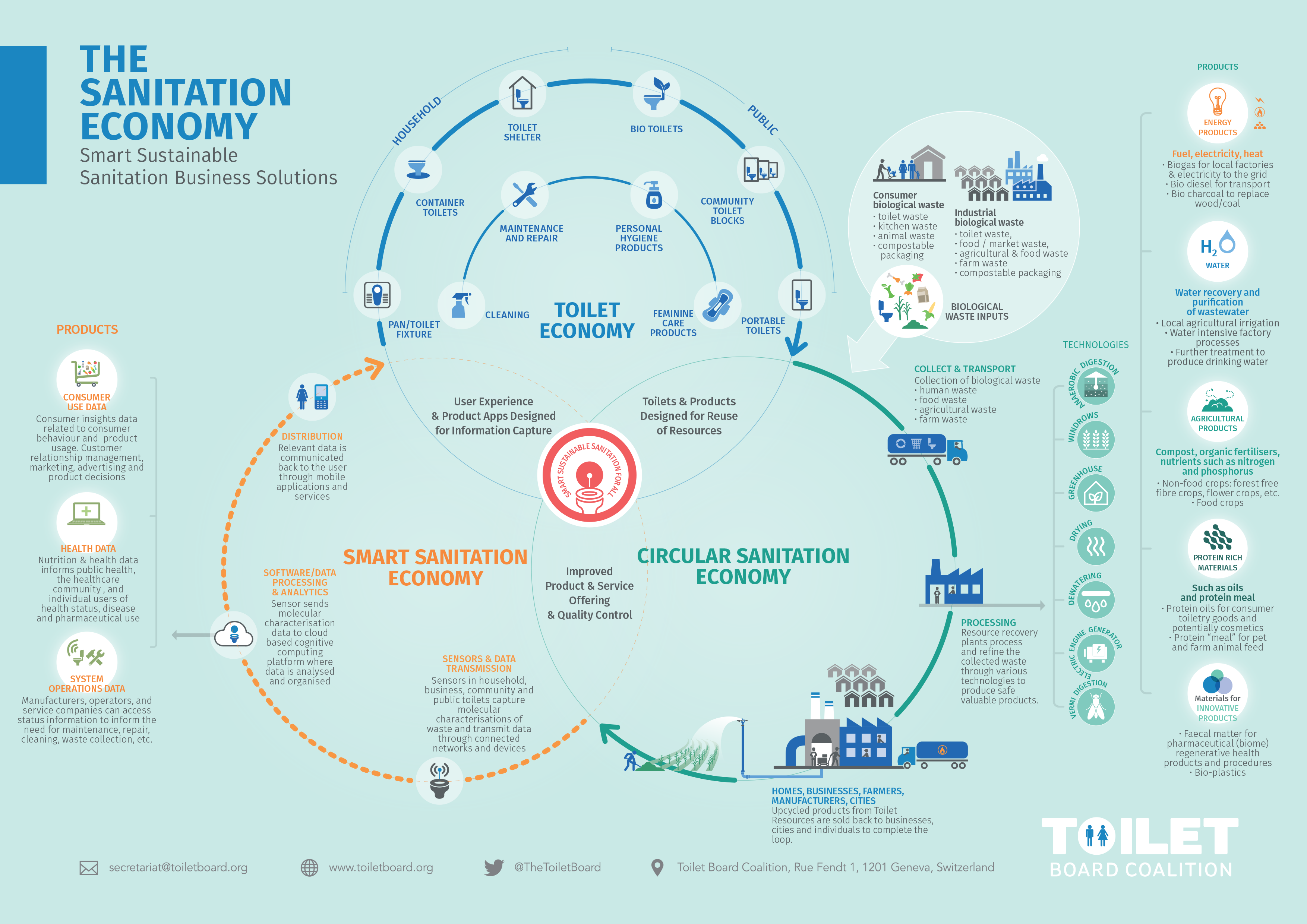- Forum
- categories
- Resource recovery
- Resource recovery from excreta, faecal sludge or wastewater
- The new economy of excrement (recent article in Nature) - Terms are rather important
The new economy of excrement (recent article in Nature) - Terms are rather important
8350 views
- csk
-

- I work on the toilet, sanitation, biogas, FSM, environmental science and engineering, and I hope to contribute to the toilet revolution in China and in the global. I am happy to share Chinese WASH story.
Less- Posts: 42
- Karma: 1
- Likes received: 15
That's very good comments!
When we translate "excreta" and "excrement" from English to Chinese. I am also confused.
Now I also learned.
Thanks.
Dr. Shikun CHENG, from University of Science and Technology Beijing (worked on SEI Sweden-China Erdos Eco-town Project before)
When we translate "excreta" and "excrement" from English to Chinese. I am also confused.
Now I also learned.
Thanks.
Dr. Shikun CHENG, from University of Science and Technology Beijing (worked on SEI Sweden-China Erdos Eco-town Project before)
Shikun Cheng,
Professor, Ph.D
Center for Sustainable Environmental Sanitation (CSES)
Department of Environmental Science and Engineering
University of Science and Technology Beijing (USTB)
This email address is being protected from spambots. You need JavaScript enabled to view it.
Professor, Ph.D
Center for Sustainable Environmental Sanitation (CSES)
Department of Environmental Science and Engineering
University of Science and Technology Beijing (USTB)
This email address is being protected from spambots. You need JavaScript enabled to view it.
Please Log in to join the conversation.
You need to login to reply- Elisabeth
-
- User is blocked
- Freelance consultant since 2012
Less- Posts: 3372
- Karma: 54
- Likes received: 932
Re: The new economy of excrement
I agree with you on the importance of terms. Hence my ongoing work on Wikipedia where I try to get all the definitions of terms "right", and hope that over time people will start to use them in the right way (or at least standardise on them).
That thing about waste or resource: A material can be both. It is a waste to Person A but if Person B has a use for it, it becomes a resource for Person B.
One example: waste paper. I put it in my waste paper bin. It's a waste for me and I have to pay a fee to have it collected from my house. The recycling companies come and get it, they make paper and cardboard out of it, for them it's an input material and a resource. They can sell the new products that they have produced from this input material. But it would be wrong to say that "waste paper" is not a waste for me.
I had the same discussion while doing work on the Wikipedia article on composting. Another editor insisted on deleting all the places where the term "organic solid waste" or "municipal solid waste" occurred. He didn't want to see the term "waste" but always wanted to speak of material or resource (as an input for composting). I disagreed with him for the reasons outlined above. Something can be a waste first, then a resource and a new product later.
Having said that, - like you - I far prefer using the neutral and exact term "human excreta" instead of "human waste". To me, human waste is more what I would put into a bin, i.e. waste produced by humans. It could also be that in German we don't have the term "human waste", so I didn't grow up with that way of thinking.
Regards,
Elisabeth
That thing about waste or resource: A material can be both. It is a waste to Person A but if Person B has a use for it, it becomes a resource for Person B.
One example: waste paper. I put it in my waste paper bin. It's a waste for me and I have to pay a fee to have it collected from my house. The recycling companies come and get it, they make paper and cardboard out of it, for them it's an input material and a resource. They can sell the new products that they have produced from this input material. But it would be wrong to say that "waste paper" is not a waste for me.
I had the same discussion while doing work on the Wikipedia article on composting. Another editor insisted on deleting all the places where the term "organic solid waste" or "municipal solid waste" occurred. He didn't want to see the term "waste" but always wanted to speak of material or resource (as an input for composting). I disagreed with him for the reasons outlined above. Something can be a waste first, then a resource and a new product later.
Having said that, - like you - I far prefer using the neutral and exact term "human excreta" instead of "human waste". To me, human waste is more what I would put into a bin, i.e. waste produced by humans. It could also be that in German we don't have the term "human waste", so I didn't grow up with that way of thinking.
Regards,
Elisabeth
Dr. Elisabeth von Muench
Freelance consultant on environmental and climate projects
Freelance consultant on environmental and climate projects
Please Log in to join the conversation.
You need to login to reply
Agreed that the word excreta is a more accurate term if one is referring to faeces and urine. Excrement as I mentioned refers only to faeces, i.e. the material discharged from the bowels of humans and animals.
I just thought it telling that a journal with the high stature of Nature is found using the word excrement when they were referring to excreta.
The Toilet Board Coalition uses rather neutral euphemisms such as toilet waste, human waste and animal waste.
Terms are rather important since the implicit value to society is affected by whether something is termed a resource or a waste.
Regards
I just thought it telling that a journal with the high stature of Nature is found using the word excrement when they were referring to excreta.
The Toilet Board Coalition uses rather neutral euphemisms such as toilet waste, human waste and animal waste.
Terms are rather important since the implicit value to society is affected by whether something is termed a resource or a waste.
Regards
Arno Rosemarin PhD
Stockholm Environment Institute
This email address is being protected from spambots. You need JavaScript enabled to view it.
www.sei.org
www.ecosanres.org
Stockholm Environment Institute
This email address is being protected from spambots. You need JavaScript enabled to view it.
www.sei.org
www.ecosanres.org
Please Log in to join the conversation.
You need to login to reply- Elisabeth
-
- User is blocked
- Freelance consultant since 2012
Less- Posts: 3372
- Karma: 54
- Likes received: 932
Re: The new economy of excrement
Thanks for bringing this nice article to our attention!
You got me confused now about "excrement"...
Just to make sure I got it right (and that it's also right on Wikipedia):
- Excrement = feces only (when putting "excrement" into Wikipedia there is a redirect to feces: en.wikipedia.org/wiki/Feces)
- Excreta = feces and urine (when putting "excreta" into Wikipedia there is a redirect to "human excreta" which redirects to "human waste": en.wikipedia.org/wiki/Human_waste)
Would you say this is correct or are any adjustments needed?
When I see excrement used in Wikipedia articles, I tend to change it to excreta because I find usually people mean both (urine and faeces). Also I would say excreta has become the more commonly used term - right?
Coupling the word "economy" with sanitation - like they have done in the article in Nature - seems to become more popular. See e.g. here this new report by Toilet Board Coalition ("Introducing the sanitation economy"): www.toiletboard.org/sanitation-economy
Regards,
Elisabeth
You got me confused now about "excrement"...
Just to make sure I got it right (and that it's also right on Wikipedia):
- Excrement = feces only (when putting "excrement" into Wikipedia there is a redirect to feces: en.wikipedia.org/wiki/Feces)
- Excreta = feces and urine (when putting "excreta" into Wikipedia there is a redirect to "human excreta" which redirects to "human waste": en.wikipedia.org/wiki/Human_waste)
Would you say this is correct or are any adjustments needed?
When I see excrement used in Wikipedia articles, I tend to change it to excreta because I find usually people mean both (urine and faeces). Also I would say excreta has become the more commonly used term - right?
Coupling the word "economy" with sanitation - like they have done in the article in Nature - seems to become more popular. See e.g. here this new report by Toilet Board Coalition ("Introducing the sanitation economy"): www.toiletboard.org/sanitation-economy
Regards,
Elisabeth
Dr. Elisabeth von Muench
Freelance consultant on environmental and climate projects
Freelance consultant on environmental and climate projects
Please Log in to join the conversation.
You need to login to reply
See the recent article in Nature "The New Economy of Excrement" by Chelsea Wald. www.nature.com/news/the-new-economy-of-excrement-1.22591
Interesting that even a journal with the stature of Nature uses the word "excrement" which refers strictly to faeces when in fact the author meant excreta. That the volume ratio of urine to faecal material in excreta is 10 to 1 is still not common knowledge.
Anyway the article touches on the reuse work of PIVOT in Uganda.
The work from PIVOT Kenya was first reported in SuSanA in 2014.
forum.susana.org/forum/categories/169-pr...pivot-ltd-kenya#9398
and in the project database
www.susana.org/en/resources/library/details/2097
Also BioCycle in Durban that produce BSF larvae from sludge is described.
And if you want to find out what sort of money can be had in these businesses go to
REVAMP - SEI's process tool for reuse.
www.sei-international.org/mediamanager/d...I-2016-DB-REVAMP.pdf Contact for that is This email address is being protected from spambots. You need JavaScript enabled to view it.
Regards
Interesting that even a journal with the stature of Nature uses the word "excrement" which refers strictly to faeces when in fact the author meant excreta. That the volume ratio of urine to faecal material in excreta is 10 to 1 is still not common knowledge.
Anyway the article touches on the reuse work of PIVOT in Uganda.
The work from PIVOT Kenya was first reported in SuSanA in 2014.
forum.susana.org/forum/categories/169-pr...pivot-ltd-kenya#9398
and in the project database
www.susana.org/en/resources/library/details/2097
Also BioCycle in Durban that produce BSF larvae from sludge is described.
And if you want to find out what sort of money can be had in these businesses go to
REVAMP - SEI's process tool for reuse.
www.sei-international.org/mediamanager/d...I-2016-DB-REVAMP.pdf Contact for that is This email address is being protected from spambots. You need JavaScript enabled to view it.
Regards
Arno Rosemarin PhD
Stockholm Environment Institute
This email address is being protected from spambots. You need JavaScript enabled to view it.
www.sei.org
www.ecosanres.org
Stockholm Environment Institute
This email address is being protected from spambots. You need JavaScript enabled to view it.
www.sei.org
www.ecosanres.org
Please Log in to join the conversation.
You need to login to reply
Share this thread:
- Forum
- categories
- Resource recovery
- Resource recovery from excreta, faecal sludge or wastewater
- The new economy of excrement (recent article in Nature) - Terms are rather important
Recently active users. Who else has been active?
Time to create page: 0.087 seconds








